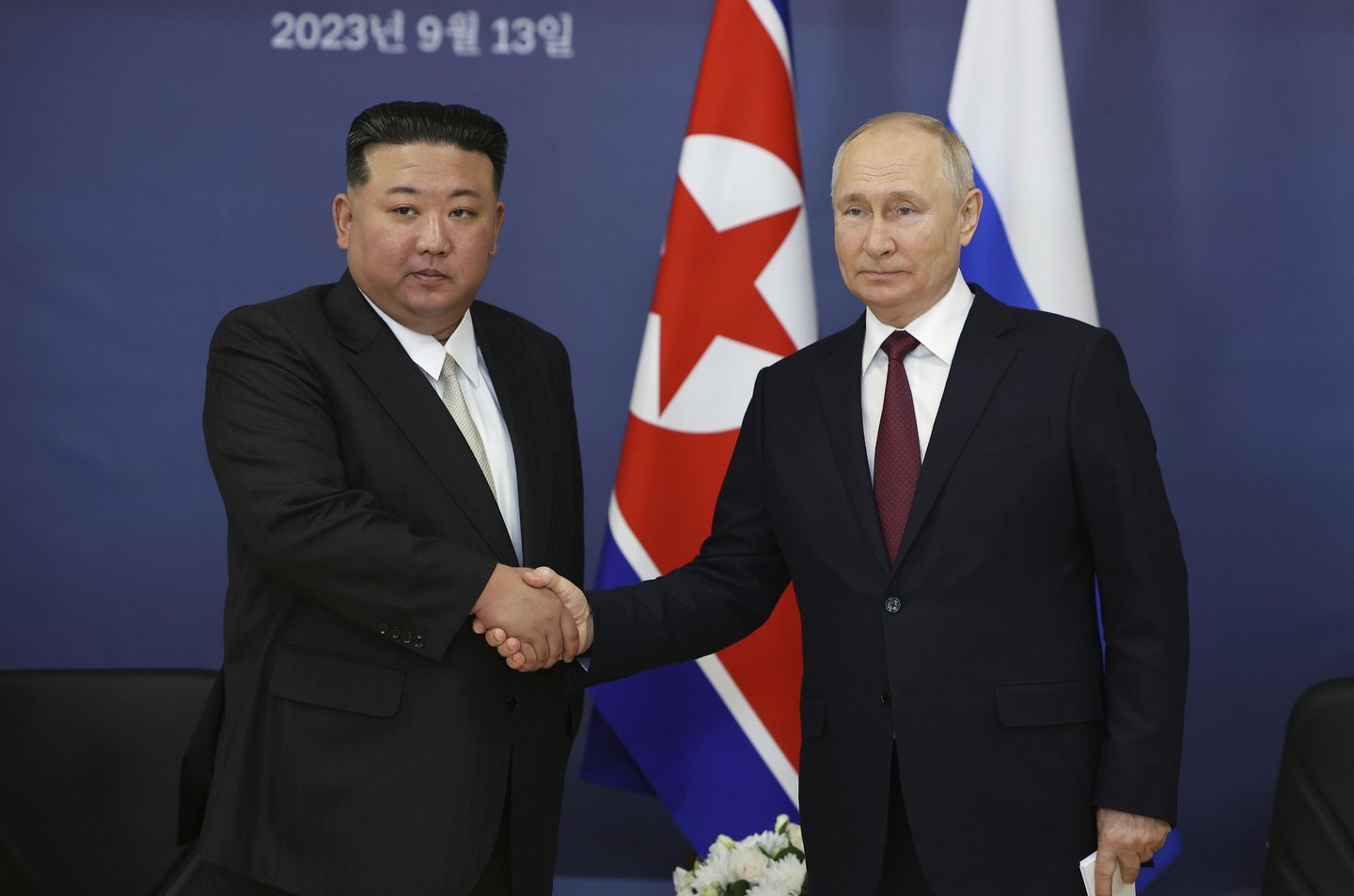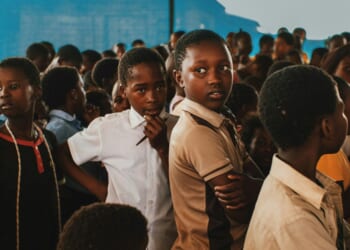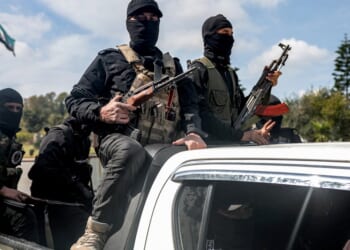
SEOUL, South Korea — The alliance between invasive Russia and ultra-militarist North Korea is spearheading a brutal new world order that a weakened West is unprepared for, a leading expert believes.
“North Korea is the only country able and willing to produce ammunition for Russia and is the only country which can essentially send their troops to the front line,” said Andrei Lankov. “North Koreans proved good soldiers, and I think this is only the beginning: They are likely to be very good once they learn more about the technologies of modern war.”
Mr. Lankov, who was born in Russia, studied at Pyongyang’s Kim Il-sung University in the Soviet days and now watches the state from his professorial perch at Seoul’s Kookmin University, where he is followed by both English- and Russian-speaking audiences.
The bilateral partnership signed by Russian President Vladimir Putin and North Korean leader Kim Jong-un in 2024 is “purely transactional” but provides a “bonanza” for North Korea, Mr. Lankov said.
Per South Korean intelligence, North Korea has sent Russia as many as 12 million artillery shells. Consensus estimates of troops deployed are from 12,000 to 13,000.
That number is sustainable. According to World Population Review’s Military Size by Country 2025 report, North Korea fields the world’s fourth-largest army after China, India and the United States. With 1.28 million men under arms, North Korea is ahead of Russia, with 1.1 million.
Much of Pyongyang’s force is low quality, but around 200,000 are believed to be crack troops.
Amid debate over the unity, or not, of the so-called “CRINK” — the authoritarian axis of China, Russia, Iran and North Korea — ideology should not be overstated, Mr. Lankov believes.
“The world that is seemingly emerging is very similar to the 1700s, a period when pretty much all alliances were marriages of convenience,” Lankov said. “Ideology played zero role.”
Mr. Kim’s deployment to Russia may herald a cynical new business based on the model pioneered by the fearsome Swiss mercenary units of medieval Europe.
“North Korea will be able to make money by shipping regiments to friendly governments across the world,” Mr. Lankov said.
With large-scale, ultra-kinetic conflict returning, Moscow and Pyongyang are gaining combat experience superior to the West’s.
“Developed countries may need to fight, not the wars of the last half century which were punitive expeditions to developing nations, but real wars which we wrongly believed to be a thing of the past,” he warned.
Guns and butter
“For 60 or 70 years, North Korea was seen by Russians as a crazy place and that reputation has not changed, but even if you have unsavory allies, you tend to have sympathy toward them,” Mr. Lankov told The Washington Times. “And North Korea is Russia’s only ally in this war.”
With millennial Moscow facing the isolation North Korea endured for decades, new horizons are opening for Pyongyang.
“Given the inclination of the Russian government to avoid fighting a war with draftees, North Korea is extremely important,” Mr. Lankov said. “The Russian government understands that sending draftees into combat will seriously damage its popularity and support — which is remarkably high right now.”
Despite heavy casualties, North Koreans fighting in Kursk were assessed by Ukraine as fitter, more cohesive, more aggressive and better marksmen than Russian soldiers.
With the Kremlin offering increasing sums for contract soldiers, North Koreans also make economic sense.
“We don’t know how much North Korea is paid for its soldiers, but you can be certain they are cheaper than Russian volunteers,” Mr. Lankov added.
So far, North Korean troops have restricted themselves to Russian soil: They have not fought in Ukraine proper. A Moscow source, speaking off the record, said this will likely continue.
“Putin does not want to use North Korean troops in Ukraine, because that could open the door for NATO to send in troops,” he claimed.
Still, Mr. Kim’s men can guard borders and installations, freeing Russians for operations, the source added.
Mr. Lankov reckons that if the war drags on, North Koreans will fight inside Ukraine.
Indications of Russia’s repayments to North Korea are appearing.
Ukrainian sources note that North Korean ballistic missiles have become increasingly accurate, indicating transfer of guidance technologies. Russia is also believed to be passing over drone-manufacturing technologies.
Russian air-defense systems have been identified in North Korea. There are suspicions of gifts of naval propulsion and command suites.
North Korea, geographically ill-suited to agriculture, is receiving food.
“On Russian blogs we see references to Russian chocolate, canned food and sausage in Pyongyang shops,” Mr. Lankov said. “On top of that, North Korea media are writing up the health benefits of wheat flour and baked goods,” indicating Russian supply, he continued.
Transport links across the 7.4-mile-wide (or 12-kilometers-wide) North Korea-Russia border are expanding.
“On top of the cross-border rail bridge linking the two countries, a road bridge is being built,” Mr. Lankov said, though roads on both sides of the border are rough.
Following Russian Foreign Minister Sergey Lavrov’s trip to Wonsan this month, two Moscow-Pyongyang flights per week have been announced.
North Korea’s power grid does not use natural gas, but Russia is not, Mr. Lankov believes, supplying much, if any, oil.
“Some is likely being shipped, but building a fuel line — which is expensive — is not being discussed,” he said.
That leaves Pyongyang reliant on Beijing for fuel, via a dedicated pipeline under the Yalu River.
The labor force is another area of activity.
Russia has announced plans to import North Korean engineering and labor units. With the Russian Far East underpopulated, civilian labor could be exported.
“North Korea can probably send 300,000-400,000 citizens,” Mr. Lankov said, noting that the Philippines earns significant forex from labor exports.
What next? “For the time being, Russia needs North Korea,” Mr. Lankov said.
He doubts Kiev or Moscow can sustain their current intensity of operations indefinitely, and believes Ukrainian resistance might suddenly collapse as Germany did in 1918. Alternatively, a lower-intensity, long-term stalemate might set in.
Regardless, he says both North Koreans and Russians are enjoying surprising prosperity, and both regimes are secure: neither is likely to collapse.
“We have to see the world as it is, not as we want it to be,” he warned.
The West will have to relearn “the ability to mobilize, and to endure serious economic sacrifices,” he said — and recalibrate some liberal ideas.
Post-Cold War, “The West could afford to jettison the old ‘power-and-glory’ type of patriotism, because the world was safe,” he said.
Now it needs to re-create strong shared identities, he suggested, perhaps along Israeli or Turkish lines.
“History used to be taught to create a sense of national pride with a touch of chauvinism which was extremely useful if you believed your boys were going to be soldiers,” he said. “It was more propaganda than history, but I am afraid it was a necessary evil and is probably becoming a necessary evil now.”

















